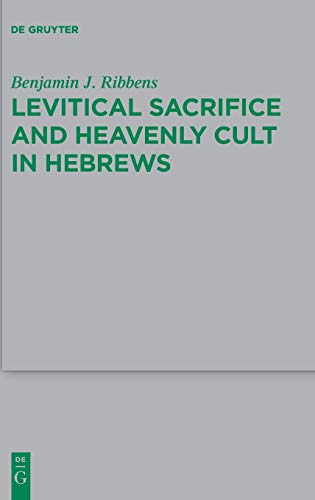Levitical Sacrifice and Heavenly Cult in Hebrews
Written by Benjamin J. Ribbens Reviewed By Michael KibbeIn the midst of an ever-growing volume of literature on the sacrificial elements of Hebrews, Ben Ribbens’s recent dissertation deals particularly with how Hebrews understand the efficacy of Old Testament sacrifices in relation to Christ’s sacrifice. It does not unpack the OT’s own perspective on this issue, but rather focuses on Hebrews itself as well as other interpretations of the OT from the Second Temple period.
Ribbens suggests, first of all, that Hebrews shares with numerous Second Temple Jewish texts at least the following three assumptions: that OT sacrifices did “atone” for sin, that the disposition of the offerer mattered (thus sacrifices were not effective ex opere operato), and that, in cases involving a heavenly sanctuary, OT cultic practices do, or should, correspond to those in heaven. Second Temple texts exhibit a great deal of variety vis-à-vis cultic ideas; Ribbens argues that Hebrews shows particular affinity with the mystical apocalyptic tradition, wherein the heavenly cult is in heaven rather than identical to heaven (or the cosmos) and is equivalent to the throne room of God, the heavenly cult is already functioning rather than waiting in the wings for the eschaton, and heavenly beings (or a single heavenly being in Hebrews’s case) act as priests in that heavenly sanctuary.
Keeping an eye on this mystical apocalyptic background, Ribbens then moves through the various key texts in Hebrews to further unpack the nature of the heavenly sanctuary. That sanctuary is, according to Hebrews (and consistent with other apocalyptic texts), created, spatio-temporal, in need of purification via a heavenly cultic act, and a pattern for the earthly cult—both structurally and functionally (pp. 129–30).
The heavenly cult as a pattern for the earthly cult brings into focus both the similarities and the differences between Hebrews and its contemporaries. Frequently, the ongoing activity of the heavenly cult keeps the earthly cult on its feet, so to speak—earthly cultic activity works because there is, simultaneously, heavenly cultic activity. Hebrews diverges from this pattern in two ways: first, Hebrews argues that the only cultic activity in the heavenly sanctuary is that of Jesus himself following his death, resurrection, and ascension—thus, cultic activity on earth predates cultic activity in heaven even if the positions are reversed vis-à-vis the sanctuary itself. Second, Hebrews also claims that the advent of the heavenly cultic activity marks the advent of a new age, and, therefore, the end of earthly cultic activity (pp. 137–39).
This creates an obvious problem: how can the heavenly cult simultaneously post-date, validate, and terminate the earthly cult? Ribbens labels the OT sacrifices “sacramental, Christological types” (pp. 236), meaning that they were effective because of their correspondence to the later work of Christ. Effective in what way? Clearly, for Hebrews, Christ’s sacrifice accomplishes things that the OT sacrifices—even when validated by Christ’s sacrifice—did not. Ribbens outlines five potential cultic accomplishments that Hebrews discusses vis-à-vis OT sacrifices—five things that sacrifices could accomplish, according to Hebrews, and whether or not the OT sacrifices actually did so: forgiveness of sins (yes), atonement (yes), access to God (no), perfection (no), and redemption (no). He then discusses the longer list of tasks that Christ’s sacrifice did accomplish: atonement, forgiveness, purification, sanctification, perfection, redemption, removal of sin, forgetfulness of sin, and purification of the conscience. The critical points here are that 1) according to Hebrews, OT sacrifices did accomplish things beyond external cleansing, 2) those accomplishments were possible only by means of their sacramental and typological connection to the later work of Christ, and 3) the later work of Christ made continuation of the OT sacrifices unnecessary.
Ribbens’s book is a welcome addition to scholarship on Hebrews’s sacrificial theology. It is a serious piece of research, especially concerning notions of sacrifice and atonement in Second Temple Judaism. If I have a quibble, it is with Ribbens’s development of the nuances of “forgiveness.” First, he identifies forgiveness (in relation to redemption) as in some sense an inferior salvific good: “[f]orgiveness does not … mean that the sin or trespass is fully dealt with” (p. 183). Earlier, though, he claims that, according to Heb 10:18, the presence of forgiveness (which in this context refers not to OT sacrifices but to Christ’s sacrifice) implies the end of any need for subsequent sacrifice for sins (pp. 159–60). But this is a minor concern that does not detract from the quality of the overall work.
NB: For those familiar with recent debates on the location and sequence of Jesus’s atoning work, Ribbens agrees with those who locate Jesus’s priestly work primarily in heaven rather than on earth, while still affirming the sacrificial nature of the cross (pp. 108, 132–33; see Bobby Jamieson’s recent essay “Where and When Did Jesus Offer Himself? A Taxonomy of Recent Scholarship on Hebrews,” CBR 15 [2017]: 338–68 for discussion of Ribbens and others on this issue).
Michael Kibbe
Michael Kibbe
Moody Bible Institute
Spokane, Washington, USA
Other Articles in this Issue
This article considers the emergence of an evangelical endorsement of the Two-Source Hypothesis as a solution to the Synoptic Problem in the first half of the twentieth century...
Brian Simmons has made a new translation of the Psalms (and now the whole New Testament) which aims to ‘re-introduce the passion and fire of the Bible to the English reader...
Nearly three hundred fifty years after Martin Luther nailed the 95 Theses to the castle church door in Wittenburg, Charles Haddon Spurgeon confronted the growing influence of Roman Catholic teaching within the Church of England...
A Theological Sickness unto Death: Philip Rieff’s Prophetic Analysis of our Secular Age
by Bruce Riley AshfordPhilip Rieff’s sociological analyses explore the implications of Western Civilization’s unprecedented attempt to maintain society and culture without reference to God...
The giant of Old Princeton, B. B. Warfield, outspokenly condemned the racism and rigid segregation of American society of his day...







